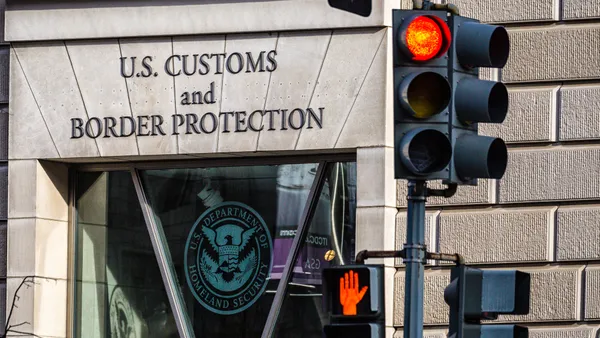UPDATE: June 25, 2019: A UPS spokesperson sent the following statement to Supply Chain Dive when asked if the carrier is in agreement with the concerns FedEx laid out in its lawsuit against the U.S. Commerce Department:
"UPS transports packages for customers around the world, when they are not restricted by government policies or laws. We regularly monitor the requirements of governments concerning shipments for our customers and utilize screening and administrative processes to ensure compliance. UPS continues to follow government directives in the markets where the company operates. UPS will not join the lawsuit filed by FedEx."
Dive Brief:
- FedEx filed suit in the U.S. District Court for the District of Columbia Monday against the U.S. Department of Commerce and its subsidiary, the Bureau of Industry and Security (BIS), alleging compliance with Export Administration Regulations (EAR) is virtually impossible and the carrier should not be liable for such enforcement. "FedEx is a transportation company, not a law enforcement agency," the carrier said in a statement.
- As laid out in the suit, FedEx and its competitors are required to screen international shipments to ensure they comply with EAR or have the required BIS export license. The carrier is then legally liable for noncompliant packages. The suit claims this expectation and the accompanying penalties are unconstitutional and infeasible. "The EAR effectively force FedEx to police the content of its packages in a manner it is not able to do," reads the suit. FedEx CEO Fred Smith told Fox Business these penalties can reach up to $250,000 per package.
- "We have not yet reviewed the complaint, but nevertheless look forward to defending Commerce’s role in protecting U.S. national security,” a Commerce Department spokesperson told Supply Chain Dive in an email.
Dive Insight:
FedEx argues carriers are not liable for other types of screenings and inspections they are legally required to perform, such as name and address checks. The carrier therefore should not be liable for EAR violations committed by their customers on the grounds that such penalties violate the carrier's Fifth Amendment due process rights and "unreasonably hold common carriers strictly liable for shipments that may violate the EAR without requiring evidence that the carriers had knowledge of any violations. This puts an impossible burden on a common carrier such as FedEx to know the origin and technological make-up of contents of all the shipments it handles and whether they comply with the EAR," the carrier said in a statement.
FedEx brings this suit just as it sits at the heart of a dispute between Chinese mobile phone manufacturer Huawei and the U.S. government. The carrier is under investigation by the Chinese government after it sent two packages intended for Huawei offices in China to the U.S. instead. FedEx claims the incident was a mistake, apologized, and the packages have since been returned. Huawei said the misdirection was intentional.
Huawei is on the Trump administration's trade blacklist (by executive order) after the administration deemed it a national security threat, which means U.S. companies may not use Huawei's technology.
Beyond arguing the liability placed on carriers for compliance with such orders is unfair, FedEx claims the screening requirements are unenforceable and represent an "unreasonable burden."
"Even if FedEx were to inspect the contents of every package for reexport that it delivers, the company would not have enough information to make highly technical determinations to assess whether an item outside the U.S. is an “item subject to the EAR,” according to the complaint.
In the suit, FedEx described "a sophisticated proprietary risk-based compliance system to perform such screening," but said this technology can still not determine, for example, the amount of U.S. originated content in an electronic product shipping from Asia to the U.S.
The carrier will report its second-quarter earnings to investors later today.












